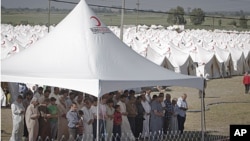As the world marks UN Refugee Day on June 20, the number of people escaping violence across the Arab world is on the rise. Pro-democracy uprisings are being brutally suppressed in places like Libya and Syria, forcing tens of thousands of people to flee for an unknown future. Many of the refugees have little hope of ever returning to the place they once called home.
The Yayladagi refugee camp near Turkey's border with Syria is housed in the ruins of a former tobacco factory. There are around 3,500 refugees living here; more families are arriving by the day.
Its occupants fled in terror, leaving their homes and the land where they belong.
They are part of a wave of Syrians escaping the government crackdown on pro-democracy protests; the latest refugees of the Arab Spring.
June 20 is UN World Refugee Day. The thousands of people uprooted by the uprising and conflict across the Arab World make this year especially poignant, says Mans Nyberg of the United Nations' Refugee Agency (UNHCR).
"It's basically the last desperate move you make when you don't have any other option," said Nyberg. "When your home is burning, you have soldiers attacking your town, you just have to leave."
A sandstorm is brewing at the Shousha refugee camp on Tunisia's border with Libya.
Hundreds of thousands of refugees have passed through here since the Libyan conflict began in February, mainly expatriate workers from Africa.
Violence in the camp between different nationalities has escalated in recent weeks. Scores of refugees were killed when parts of the camp were set on fire.
"Ten days ago we lost four of our brothers," said Shishay Tesfay, an Eritrean refugee. "They were burned in one tent. They couldn't escape because the tent is very flammable and it doesn't give you time. It just burns and is destroyed within five minutes."
For around 3,500 of the Shousha camp refugees - people from countries like Eritrea, Somalia and Sudan - there is nowhere else to go. It's too dangerous to go back to their home countries, and too dangerous in Libya.
"Everybody can see the picture of Libya," added Eritrean refugee Shishay Tesfay. "It's like a civil war. And Libyan people don't like African people, they think they are not Africa. And if I go back to Libya, it would be silly, a crazy thing."
The UN estimates there are 7 million refugees around the world like Shishay who have nowhere safe to return.
"The biggest problem today is so-called protracted refugee situations where people have been living as refugees for decades, for generations and there is no solution in sight for them," Nyberg added.
For tens of thousands of people fleeing Libya the promise of a new life in Europe can be bought for around $1,500, the average price of a boat passage across the Mediterranean.
The majority arrive here on the Italian island of Lampedusa. Mahrouf is a Bangladeshi migrant worker who was living in Tripoli.
"There is too much fighting all the time, the government and the rebels are at war," said Mahrouf. "People were dying all the time. So I came here to Italy. It took five days on the boat. We were all very lucky - the ship smashed on the rocks when we arrived here."
Several hundred refugees and migrants are thought have drowned in the past few months escaping Libya, trying to find a better life.
The UN estimates that there are 43 million uprooted people on earth. They say the only long-term solution is an end to the conflicts that force people to flee their homes, for an unknown future.

















